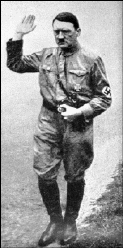Gareth Jones
[bas relief by Oleh Lesiuk]
HOME |
Stop Press |
Complete Soviet Articles & Background Information |
Précis of Gareth's
|
All Published Articles |
BOOKS
|
|
|
|
More Than Grain of Truth(2005) |
|
|
TOPICAL
'Are you Listening NYT?' U.N. Speech - Nov 2009 |
Gareth Recognised at Cambridge - Nov 2009 |
Reporter and the Genocide - Rome, March 2009 |
Order of Freedom Award -Nov 2008 |
Premiere of 'The Living' Documentary Kyiv - Nov 2008 |
Gareth Jones 'Famine' Diaries - Chicago 2008 |
Aberystwyth Memorial Plaque 2006 |
GENERAL
Scholarship Fund |
Site Map |
Links |
Legal Notices |
Sponsored Links |
Contact |
THE WESTERN MAIL
& SOUTH WALES NEWS, Tuesday 6th 1933
(Germany Under
Hitler - Second Article) GERMANY WAS NOT READY FOR
DEMOCRACY
LACKED EXPERIENCE
IN SELFGOVERNMENT
ENSLAVED BY THE NEW SYSTEMBy GARETH JONES
“Why do you
support the Nazis?” I asked a German professor who had great experience of
foreign travel, and who was a gentleman in every way. He replied, “I
support the Nazis because I am tired to death of all the little parties which
have been squabbling over the spoils of political warfare. I am for Hitler
because he has put an end to fourteen years of democratic government which
divided our people into camps bitterly loathing each other. I am for
Hitler because he has revealed the corruption on which the old party bosses
thrived.” This German
professor put his finger on one of the chief causes of the national revolution.
It is a revolt against German democracy. When the war ended Germany became
a republic based on principles of Parliamentarism. A country which
had always been accustomed to obey the dictates of an Emperor and his generals
suddenly became self-governing and, lacking the experience of real parliamentary
rule, fell into the worst errors of democracy. CONFUSED POLITICS
Never had Germany
known such political freedom as in the republican years after 1918, but never
had politics been so confused, and never had the Germans longed so much for a
firm guiding hand. A people for centuries drilled and disciplined by
Prussian generals or dominated by princelings and kings suddenly put its destiny
into the hands of dozens d parties, each with its slogans. In one general
election 37 different parties appealed for the votes of the electorate, and then
the parliament was elected the views represented by the parties clashed
vehemently that not for many months could a Government be formed. Under the German
Republic corruption began to creep into sections of public life, which before
had been remarkably pure. The pre-war German Civil Service, though badly
paid, was admirable for honesty and for its high sense of duty. After the
war certain financial scandals in Government circles aroused the hatred of the
people for the new régime, and a cry for more honesty in public service arose,
which the Nazis immediately seized for their party platform. REGIME OF OLD MEN
Moreover, the
German democracy of 1918-1933 was, in the eyes of young Germany, a régime of
old men. The proportional representation system, adapted by Germany, led
to many abuses, for Germans did not vote for “Mr. Schmidt” or “Mr.
Braun,” but for a list of party potentates, which was usually composed of
elderly men who had made big subscriptions to party funds. “Make way for
youth,” became the slogan of young people, and they determined to overthrow
this republic which had so little room for them. Propelled
entirely by deep feeling and by an instinctive hatred of self-government, the
young Germans forgot some of the fine features of German democracy: its freedom
of thought, its social services, and its housing schemes, and painted it as a
corrupt Jewish invention, to enslave the German people. Young Germans not
only felt themselves enslaved by their system at home, but also longed to break
the shackles of the Treaty of Versailles. They were, not willing to admit
that they had been defeated in the war, but attributed their debacle to a
Socialist “stab in the back” in November, 1918. Every humiliation
which Germany has suffered since the war made nationalist feeling flare up,
until by 1933 it burst forth in the flames of the National Revolution. A PROUD PEOPLE
The Germans are
a proud people and are as sensitive as the Welsh in matters of nationality,
resenting any attack on their nation. Everything which the Allies have
done since 1918 has increased the nationalist passion of the Germans. The War Guilt
Clause, the sending of black troops into the Rhineland by the, French, the
refusal to admit Germany into the League of Nations until 1926, the inferiority
in armaments, the need to pay £100,000,000 a year in reparations-all these made
the forces mount up which were to break out in revolution in 1933. But what
rankled most in the German mind was the taking away from Germany of lands
inhabited by Germans and placing them under peoples like the Poles, whom they
despised. Millions grew up with the conviction that they would willingly
die on the battlefield to, win back for Germany the Polish Corridor and other
parts which they longed to see re-united to the Fatherland. This urge to
shatter the yoke of Versailles and to set up a greater Germany, where all those
of German origin should live, led to the fiery nationalistic revolution of 1933. |
Adolf Hitler, Chancellor of Germany. |
||||||||
|
|||||||||




